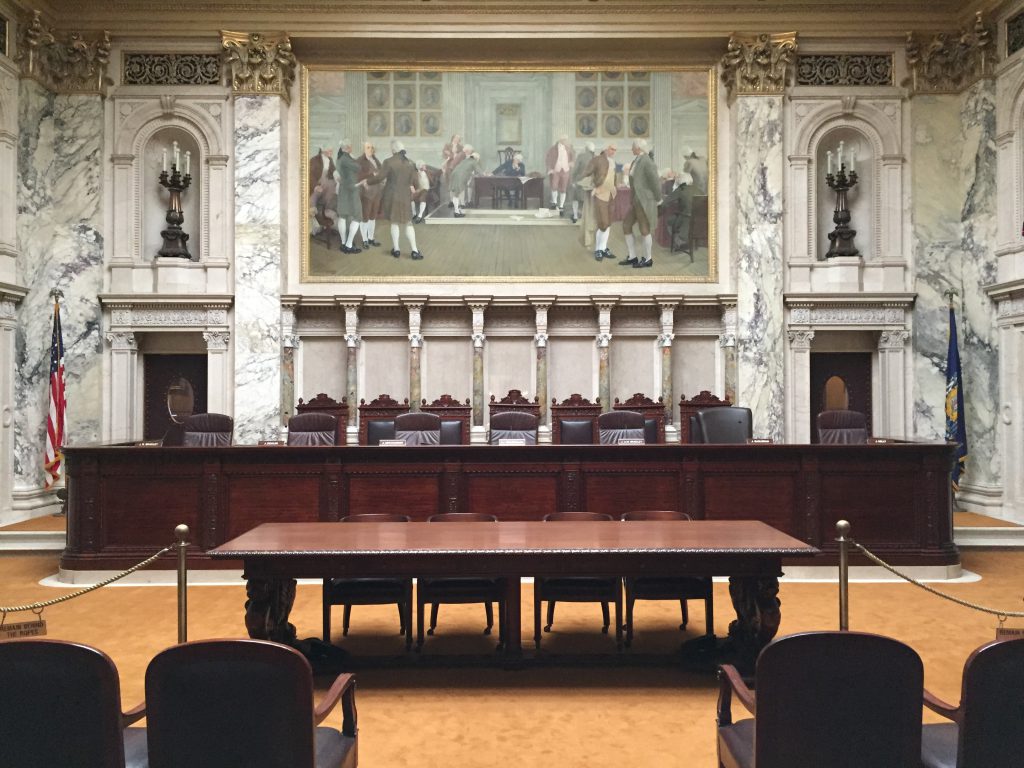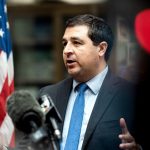Will Supreme Court Act on Mask Mandate?
State high court has sat on case for months, could decide fight between governor and Legislature.
For nearly three months, the Wisconsin Supreme Court has been sitting on a case that is at the center of the Republican maneuver to kill the COVID-19 health emergency order that Gov. Tony Evers declared in January.
With the flurry of activity on Thursday — as a divided state Assembly ended the Jan. 19 emergency, finishing what the Senate started last week, only to see Evers promptly declare a new emergency and mask order — that court case took on new importance.
LeMahieu added: “Now that the Legislature has affirmatively exercised our authority under Chapter 323” — the state’s emergency powers statute — “to revoke the overreach of executive emergency powers, we urge the Supreme Court of Wisconsin to end this constitutional crisis.”
Four of the seven Assembly Republicans who broke with their party on Thursday and voted with Democrats to preserve Evers’ Jan. 19 order made a similar appeal.
The language of the law
The legal premise behind the Republican resolution revolves around a single question: Was the Jan. 19 emergency declaration — and were the emergency orders that preceded it in November, September and August — individual emergencies? Or were they simply an extension of the first COVID-19 emergency that Evers declared soon after the pandemic began?
The new declaration that Evers issued Thursday only heightens that argument.
On March 12, 2020, Evers issued Executive Order 72, declaring the pandemic as a health emergency. That emergency reached its 60-day expiration date on May 11.
The next emergency declaration came more than two months later, with an executive order Evers issued July 30 that took effect Aug. 1 and included the state’s first mask order.
By the time the Senate voted Jan. 26, Evers had declared a public health emergency as a result of the pandemic three more times. The resolution to end the Jan. 19 emergency, introduced by state Sen. Steve Nass (R-Whitewater), declares that “the governor’s authority to address the COVID-19 coronavirus using the emergency powers identified in section 323.12 of the statutes expired on May 11.”
Disputed interpretation
That Republican interpretation of the law — which the Evers administration disputes — was the basis for two lawsuits that were filed last year opposing the subsequent emergency declarations and mask mandates.
In August, the Wisconsin Institute for Law & Liberty (WILL), a conservative law firm that has opposed the Evers administration on a number of other issues and is also challenging the authority of local public health department orders, filed a lawsuit claiming that the Aug. 1 emergency was an extension of the March 12 declaration — violating the 60-day limit and requiring the Legislature’s assent.
“The Governor lacks the power to unilaterally extend a state of emergency or to declare multiple states of emergency to deal with the same problem,” the lawsuit declared.
A circuit court judge declined to issue an injunction and let the emergency order stand pending a trial. The Legislature, the judge observed, never took any action to come into session and overturn the emergency declaration or the mask order.
The Supreme Court heard arguments on the Fabick case in mid-November. Representing the Evers administration, Hannah Jurss, an assistant state attorney general, argued that the shifting conditions in the COVID-19 pandemic could be compared to a flood that prompts the governor to declare a state of emergency.
As the flood emergency approaches its 60-day expiration, “new rainfall happens and the flooding resurges and a dam breaks,” Jurss said. “There is nothing in the plain language of the statute that says the governor could not look at those emergency circumstances and recognize that there is an occurrence that constitutes a disaster that creates an emergency.”
The case is still pending. Since it was argued, the governor issued a subsequent emergency declaration and mask order in November that carried the state into the new year, and the declaration and mask order that took effect Jan. 19 and the Legislature ended Thursday. The new declaration that Evers issued Thursday afternoon is his sixth.
In the Senate on Jan. 26, Evers had a rare Republican supporter in Sen. Robert Cowles (R-Green Bay), who had voted with the Democrats to preserve the health emergency and mask order. In a statement he issued after the vote, Cowles essentially endorsed the administration’s legal argument.
From his review of the emergency powers law, Cowles said, “I don’t see anything prohibiting a governor from declaring successive emergency orders under this 40-plus-year-old law which could have been clarified in 20-plus legislative sessions, including this session.”
Looking to the Court
It has been nearly three months since the state Supreme Court arguments. In the aftermath of Thursday’s Assembly vote and Evers’ new orders, that silence has reverberated.
In their joint statement Thursday afternoon explaining why they joined the Democrats to preserve the emergency and mask order, GOP Reps. Joel Kitchens (R-Sturgeon Bay), Jeffrey Mursau (R-Crivitz), David Steffen (R-Green Bay) and Ron Tusler (R-Harrison) said they voted out of concern for ending the mask mandate without anything to replace it.
At the same time, they expressed doubt about the legality of the multiple orders from the governor. But that was up to the courts to decide, they said.
“The Wisconsin Supreme Court has had this case for more than two months and we implore them to make a ruling as to whether or not the governor had the authority to issue his most recent order without legislative approval,” they said. Without “legal clarity,” they added, “the governor could continue to implement additional emergency orders every time the full Legislature passes a resolution” striking one down.
Why hasn’t the court decided yet?
“None of us know what the state Supreme Court’s reasoning really is,” says Rep. Mark Spreitzer (D-Beloit). “But I suspect some of it may have been that they knew the Legislature did have the power to engage in this process if it really wanted to. We saw for months that our Republican colleagues were complaining about what Gov. Evers was doing but weren’t interested in coming in and taking votes one way or the other to actually be part of the process of governing.”
Marquette University law professor Chad Oldfather offers three possible explanations for the court’s delay.
Another possibility is that the court wants the political branches to resolve it. “That’s not an unreasonable ask from a properly functioning state government,” he says — observing wryly, “And yes I do mean to imply that we don’t seem to have one of those right now.”
Or the Supreme Court — which has been widely seen as increasingly partisan in the last decade — “might be hoping to avoid having to weigh in on yet another hotly contested issue with clear partisan overtones,” Oldfather adds.
“In that sense the court would be looking to protect itself, essentially looking to run out the clock, hoping that the Legislature and governor will work things out so that it doesn’t have to expend more of its institutional standing by resolving yet another dispute that virtually everyone will regard it as having resolved by resort to politics rather than law,” he says.
Following that kind of strategy isn’t unusual, he notes. “It’s a big part of the explanation for why the U.S. Supreme Court just let the various Trump campaign challenges to the election results sit on its docket.”
And the answer might be some combination of each of those. “All of them could, to some degree or other, be part of the explanation,” Oldfather says. “And none of them is necessarily something that should be regarded as nefarious.”
Reprinted with permission of Wisconsin Examiner.
More about the Coronavirus Pandemic
- Governors Tony Evers, JB Pritzker, Tim Walz, and Gretchen Whitmer Issue a Joint Statement Concerning Reports that Donald Trump Gave Russian Dictator Putin American COVID-19 Supplies - Gov. Tony Evers - Oct 11th, 2024
- MHD Release: Milwaukee Health Department Launches COVID-19 Wastewater Testing Dashboard - City of Milwaukee Health Department - Jan 23rd, 2024
- Milwaukee County Announces New Policies Related to COVID-19 Pandemic - David Crowley - May 9th, 2023
- DHS Details End of Emergency COVID-19 Response - Wisconsin Department of Health Services - Apr 26th, 2023
- Milwaukee Health Department Announces Upcoming Changes to COVID-19 Services - City of Milwaukee Health Department - Mar 17th, 2023
- Fitzgerald Applauds Passage of COVID-19 Origin Act - U.S. Rep. Scott Fitzgerald - Mar 10th, 2023
- DHS Expands Free COVID-19 Testing Program - Wisconsin Department of Health Services - Feb 10th, 2023
- MKE County: COVID-19 Hospitalizations Rising - Graham Kilmer - Jan 16th, 2023
- Not Enough Getting Bivalent Booster Shots, State Health Officials Warn - Gaby Vinick - Dec 26th, 2022
- Nearly All Wisconsinites Age 6 Months and Older Now Eligible for Updated COVID-19 Vaccine - Wisconsin Department of Health Services - Dec 15th, 2022
Read more about Coronavirus Pandemic here
More about the Statewide Mask Mandate
- Court Watch: Why Court Voided Evers Emergency Order - Gretchen Schuldt - Apr 5th, 2021
- Statement by Heartland Institute Director Jeré Fabick on WI Supreme Court Victory Against Gov. Tony Evers - Heartland Institute - Mar 31st, 2021
- Senator Agard: Statement on Supreme Court Decision - Dane County Executive Melissa Agard - Mar 31st, 2021
- Wisconsin’s Hyperpartisan Supreme Court is Endangering the Public - Democratic Party of Wisconsin - Mar 31st, 2021
- Wisconsin Supreme Court: Gov. Evers’ Multiple Emergency Declarations Violate Law - Wisconsin Institute for Law & Liberty - Mar 31st, 2021
- Rep. Hesselbein Statement on Supreme Court Ruling on Emergency Orders - State Senate Democratic Leader Dianne Hesselbein - Mar 31st, 2021
- Statement on Wisconsin Supreme Court Decision - State Sen. Jon Erpenbach - Mar 31st, 2021
- Gov. Evers Releases Statement Regarding Supreme Court Decision - Gov. Tony Evers - Mar 31st, 2021
- Rep. Hintz: Statement on Wisconsin Supreme Court Ruling - State Rep. Gordon Hintz - Mar 31st, 2021
- State Supreme Court Overrules Evers’ Emergency Powers - Laurel White - Mar 31st, 2021
Read more about Statewide Mask Mandate here






















